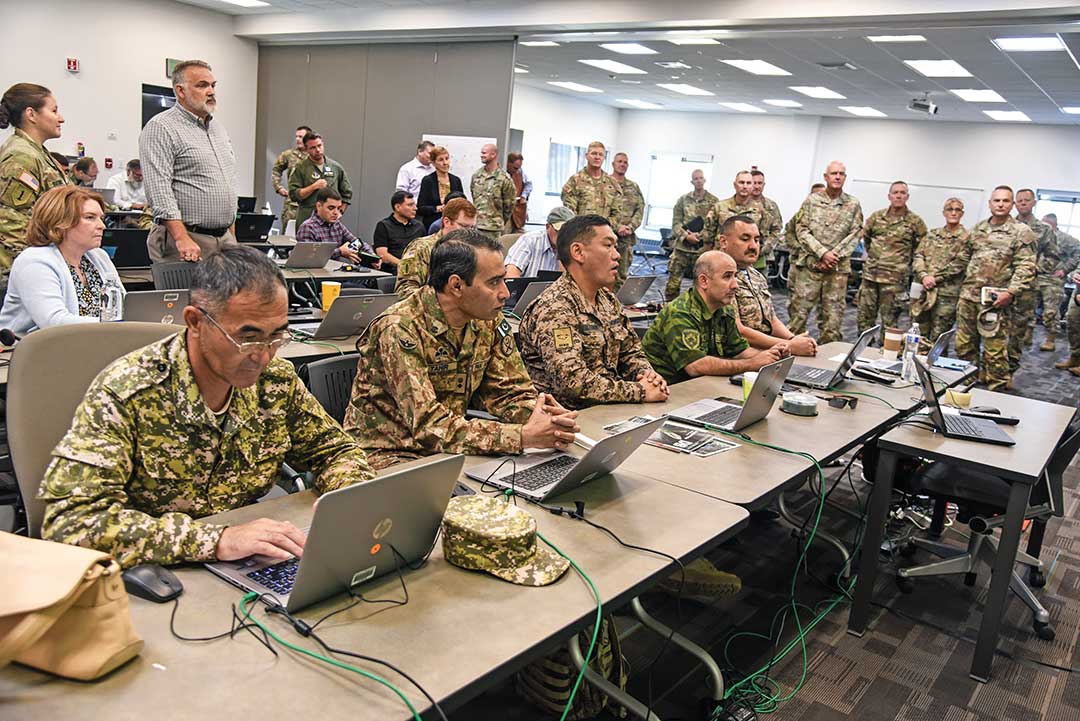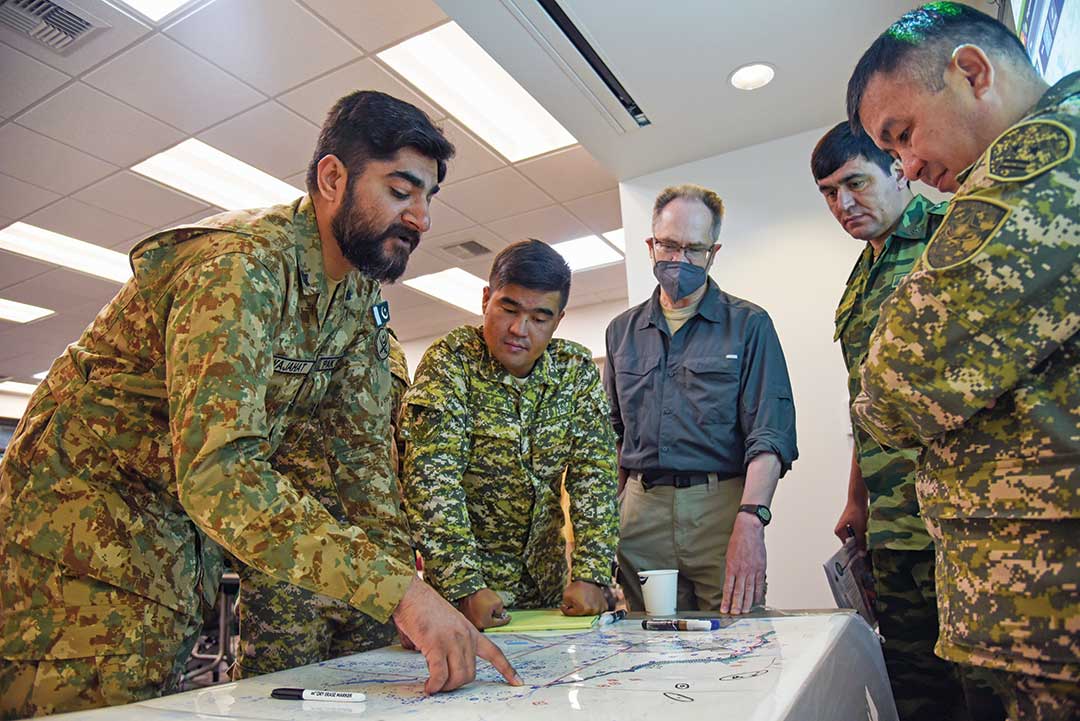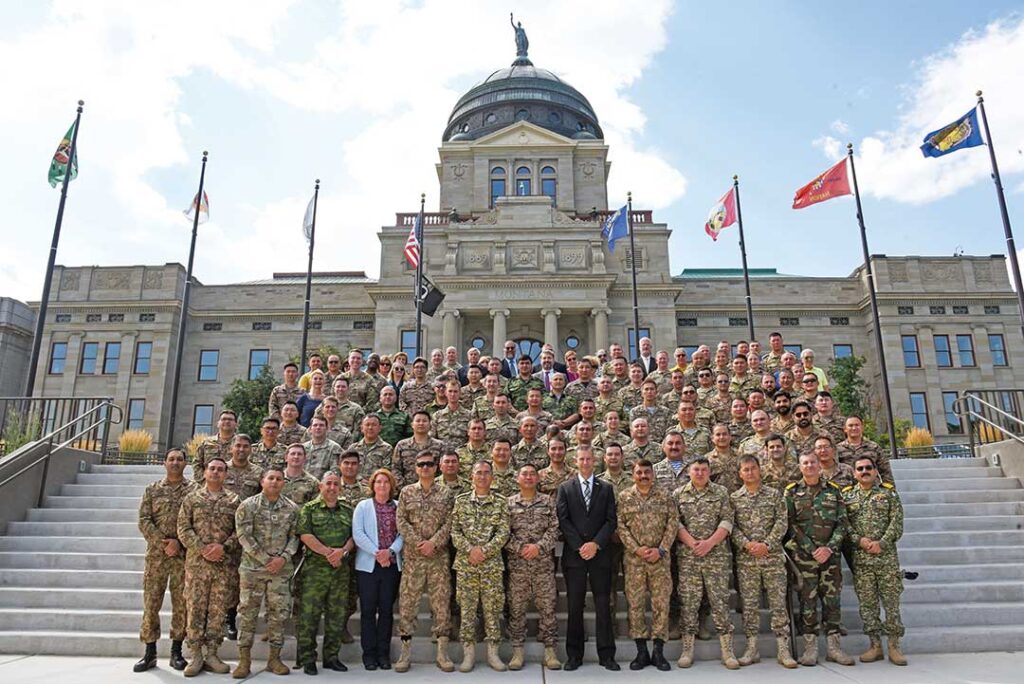UNIPATH STAFF | Photos by SGT. 1ST CLASS TERRA GATTI/U.S. ARMY NATIONAL GUARD
The nation of Donovia, determined to destabilize its neighbor Gorgas and reassert regional control, embarks on a campaign of irregular warfare: conducting assassinations, cutting gas pipelines, financing proxy forces, fomenting refugee crises.
But in the midst of the Donovian-engineered instability — which culminates with armed incursions across a river — seven nations coordinate forces to reestablish peace on the troubled border.
Kazakhstan, Kyrgyzstan, Mongolia, Pakistan and Tajikistan each provide a battalion to form Task Force Patriot under the joint command of their senior officers. Uzbekistan sends an independent task force to preserve peace along the same border. Air power, if needed, is provided by the United States.
Regional Cooperation 23, a command post exercise organized by U.S. Central Command in August 2023 for its Central and South Asian military partners, represented role-playing with a serious purpose.
Border stabilization scenarios involving military, political and humanitarian crises required the cooperation of multinational staff officers overcoming differences in language, military culture and national outlook.
Nearly 200 Kazakh, Kyrgyz, Mongolian, Pakistani, Tajik, U.S. and Uzbek troops synchronized planning, operations and intelligence gathering at a training center in Helena, Montana, equipped with a shared server and interlinked computers to represent a military headquarters.

Rather than let troops separate by nationality, officials urged all participants to sit beside counterparts from other countries in the interest of team building.
“We interact with all our neighbors in Central Asia and also the United States and by doing so learn a lot. To the very last Soldier, everyone has a specific task” said Tajik Col. Nurzoda Nurail, one of his country’s highest ranking officers at the exercise.
Regional Cooperation has occurred nearly every year since 2001, growing more refined with each iteration. Though the storylines of the exercises are fictional, real-world crises are often reflected in the content.
“It’s evolved over time from an exercise focused on peacekeeping to one focused on regional issues that include counterterrorism, stability operations, humanitarian assistance and displaced persons,” said Guy Zero, U.S. Central Command’s deputy director of exercises.
Regional Cooperation 23 provided an escalating series of provocations to improve how multinational Soldiers react as a team to different scenarios. A criminal syndicate murdered a regional mayor and smuggled drugs across the border. A displaced people’s camp became a potential recruiting ground for terrorists. A captured stolen truck contained potential biological weapons. Enemy insurgents flouted international law by erecting pontoon bridges over a river.
Missions to eliminate or capture a wanted criminal or terrorist often entailed reaching out to special operation forces operating under their own command separate from the main task forces.
As in the real world, staff officers briefing their commanders each day had to answer for operational deficiencies. For example, the task force commander questioned his subordinates about lack of communication with the Uzbek task force to plug a gap in the border defenses.
“The exercise gives opportunities to defend against enemies using not just our own assets but those of participating countries,” Uzbek Col. Takhir Djabarov said. “We enlist the power of everyone in Central Asia to work together to oppose aggression.”

Regional Cooperation also provided an opportunity for Central Asian militaries to train beside their U.S. counterparts with whom they are paired as part of the U.S. National Guard State Partnership Program.
Kyrgyzstan is paired with the Montana National Guard, Uzbekistan with the Mississippi National Guard, Kazakhstan with the Arizona National Guard and Tajikistan with the Virginia National Guard. Turkmenistan, which sent observers to the exercise, also affiliates with the Montana National Guard.
Anthony Lieto of the Peacekeeping and Stability Operations Institute of the U.S. Army War College played a large role in designing the Regional Cooperation scenarios.
Because protecting civilians from harm during armed conflict is a U.S. strategic priority, Lieto ensured it was reflected in exercise scenarios tailored to reflect realties in places like Central Asia, such as a disease outbreak in a refugee camp.
“We learn from them as they learn from us,” Lieto said of his partners from Central Asia, Pakistan and Mongolia.
Learning from partners was also a prime motivation of Kyrgyz Col. Daniar Isakov, a deputy commander of the multinational task force at the exercise. Although Kyrgyzstan conducts its own command post exercises, Col. Isakov was keen to discover how other militaries manage them.
The colonel staffed his 16-man delegation largely with junior officers in the hope they would benefit from first-hand experiences within the domains of intelligence gathering and military planning.
“Here in the U.S. every participant from senior commander to junior officer knows exactly what he’s doing to perform his duties,” Col. Isakov said.

Kazakh Col. Kanatbek Assemov spent most of the exercise as part of a team of senior officers helping guide the 200 participants through training scenarios. Regional Cooperation provided an ideal forum to engage face to face with officers from the six other participating countries, he said. The camaraderie began even earlier when multinational teams gathered to develop plans for Regional Cooperation.
“It’s well organized and well prepared,” Col. Assemov said of Regional Cooperation 23.
“We hope this exercise will help us improve security in our own country.”
Brig. Gen. Hammad Raza, director of joint warfare at Pakistan’s Joint Staff Headquarters, was head of the 15-officer Pakistani delegation at Regional Cooperation. He praised the execution of the exercise as “flawless.”
“This two-week multinational joint exercise brought us closer to partners with an excellent opportunity to understand the latest security challenges,” Brig. Gen. Raza said.
“This exercise has furthered the common understanding of the evolving nature of threats, direct and indirect effects on the civilian population, international laws governing the security and sovereignty of nations, and the significance of joint planning and the military decision-making process.”
One highlight of the exercise was an inspection by the commanders of the U.S. National Guard units who partner with troops from Central Asia. Brig. Gen. James Ring, head of the Virginia National Guard, warmly greeted familiar faces from his partner country of Tajikistan.
“We can’t overemphasize the importance of such exercises,” Brig. Gen. Ring said.

